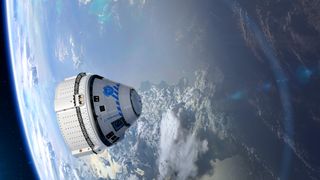
Update, 9 p.m. EDT: Boeing Starliner's launch has been scrubbed due to a valve issue on the United Launch Alliance Atlas V rocket. Here is the link to our scrub story.
Boeing's Starliner capsule will join a very exclusive club today (May 6), if all goes according to plan.
A United Launch Alliance Atlas V rocket is set to launch Starliner and its two passengers, NASA astronauts Suni Williams and Butch Wilmore, from Florida's Cape Canaveral Space Force Station today at 10:34 p.m. EDT (0234 GMT on May 7). You can watch the action live at Space.com, courtesy of NASA.
The liftoff will kick off Crew Flight Test (CFT), a roughly 10-day shakeout cruise to the International Space Station (ISS) that will be Starliner's first-ever astronaut mission. Such crewed debuts to Earth orbit have happened just five times in American history, as NASA chief Bill Nelson noted during a press briefing on Friday (May 3).
"So, you think of it: The first time [NASA astronauts] have flown on a new spacecraft started with Mercury, then with Gemini, then with Apollo, then space shuttle, then Dragon and now Starliner," Nelson said. "So it is a historical day; it's a wonderful day."
Related: Boeing Starliner 1st astronaut flight: Live updates
Dragon is the capsule built by SpaceX, which, like Boeing, won a contract from NASA's Commercial Crew Program back in 2014 to carry agency astronauts to and from the ISS.
Get the Space.com Newsletter
Breaking space news, the latest updates on rocket launches, skywatching events and more!
The goal was to get at least one American crewed vehicle up and running as soon as safely possible in the wake of the space shuttle's 2011 retirement, which left NASA completely dependent on Russian Soyuz spacecraft for crewed transportation services to and from the ISS.
SpaceX launched its version of CFT, called Demo-2, in May 2020. Elon Musk's company has since completed seven operational astronaut missions to the station, and it's in the middle of its eighth, which launched in March. As that record shows, SpaceX has proven to be a reliable and prolific partner for NASA. But the agency is still excited to get a second American astronaut taxi online, given how complex and demanding human spaceflight is.
"This will give us that additional capability, because we always look for a backup," Nelson said.
If all goes well with CFT, Starliner could launch its first contracted, six-month crewed mission to the ISS as soon as early 2025.
CFT's launch will be historic in other ways as well. For example, it will be the first-ever astronaut liftoff for the venerable Atlas V, and the first crew-carrying mission for any member of the Atlas rocket family since May 15, 1963. On that day, an Atlas LV-3B launched Faith 7, the final mission of the Mercury program, which sent NASA astronaut Gordon Cooper into orbit for 34 hours and 20 minutes.
Nelson also noted another special aspect of tonight's liftoff: It will mark the first time since the May 1968 launch of Apollo 7 that a crewed mission leaves Earth from Cape Canaveral Space Force Station (or, in its former incarnation, Cape Canaveral Air Force Station).
Many astronaut missions have lifted off from Florida's Space Coast since then, including those flown by NASA's space shuttle and SpaceX's Dragon. But those flights all launched from NASA's Kennedy Space Center, which is next door to Cape Canaveral Space Force Station.
Join our Space Forums to keep talking space on the latest missions, night sky and more! And if you have a news tip, correction or comment, let us know at: community@space.com.

Michael Wall is a Senior Space Writer with Space.com and joined the team in 2010. He primarily covers exoplanets, spaceflight and military space, but has been known to dabble in the space art beat. His book about the search for alien life, "Out There," was published on Nov. 13, 2018. Before becoming a science writer, Michael worked as a herpetologist and wildlife biologist. He has a Ph.D. in evolutionary biology from the University of Sydney, Australia, a bachelor's degree from the University of Arizona, and a graduate certificate in science writing from the University of California, Santa Cruz. To find out what his latest project is, you can follow Michael on Twitter.
-
JeffCross You're article says that the Starliner will join an elite cadre of spacecraft crewed by NASA astronauts in space. It has one easy to understand but glaring error- it will not be the sixth, but the seventh. You have forgotten the Lunar Lander of the Apollo program. A total of 19 astronauts flew in it for extended periods. The odd number is the result of Apollo 13 bringing the crew of 3 back to Earth. Then there was the Skylab, that should count as a spacecraft hosting astronauts, and there is the ISS. Now, if you get more specific and state that it is the 6th spacecraft to launch NASA astronauts into orbit, the Lunar Lander did that too, tho it launched from the Moon not Earth.Reply
